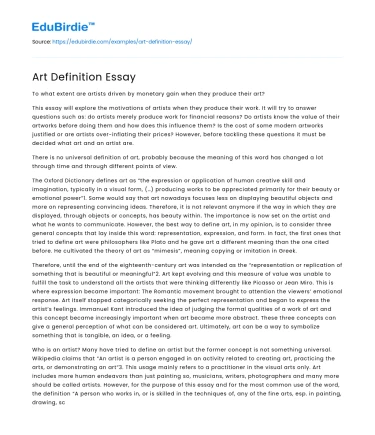To what extent are artists driven by monetary gain when they produce their art?
This essay will explore the motivations of artists when they produce their work. It will try to answer questions such as: do artists merely produce work for financial reasons? Do artists know the value of their artworks before doing them and how does this influence them? Is the cost of some modern artworks justified or are artists over-inflating their prices? However, before tackling these questions it must be decided what art and an artist are.
Save your time!
We can take care of your essay
- Proper editing and formatting
- Free revision, title page, and bibliography
- Flexible prices and money-back guarantee
There is no universal definition of art, probably because the meaning of this word has changed a lot through time and through different points of view.
The Oxford Dictionary defines art as “the expression or application of human creative skill and imagination, typically in a visual form, (…) producing works to be appreciated primarily for their beauty or emotional power”1. Some would say that art nowadays focuses less on displaying beautiful objects and more on representing convincing ideas. Therefore, it is not relevant anymore if the way in which they are displayed, through objects or concepts, has beauty within. The importance is now set on the artist and what he wants to communicate. However, the best way to define art, in my opinion, is to consider three general concepts that lay inside this word: representation, expression, and form. In fact, the first ones that tried to define art were philosophers like Plato and he gave art a different meaning than the one cited before. He cultivated the theory of art as “mimesis”, meaning copying or imitation in Greek.
Therefore, until the end of the eighteenth-century art was intended as the “representation or replication of something that is beautiful or meaningful”2. Art kept evolving and this measure of value was unable to fulfill the task to understand all the artists that were thinking differently like Picasso or Jean Miro. This is where expression became important: The Romantic movement brought to attention the viewers’ emotional response. Art itself stopped categorically seeking the perfect representation and began to express the artist’s feelings. Immanuel Kant introduced the idea of judging the formal qualities of a work of art and this concept became increasingly important when art became more abstract. These three concepts can give a general perception of what can be considered art. Ultimately, art can be a way to symbolize something that is tangible, an idea, or a feeling.
Who is an artist? Many have tried to define an artist but the former concept is not something universal. Wikipedia claims that “An artist is a person engaged in an activity related to creating art, practicing the arts, or demonstrating an art”3. This usage mainly refers to a practitioner in the visual arts only. Art includes more human endeavors than just painting so, musicians, writers, photographers and many more should be called artists. However, for the purpose of this essay and for the most common use of the word, the definition “A person who works in, or is skilled in the techniques of, any of the fine arts, esp. in painting, drawing, sculpture, etc.”4 will be used to define an artist.
The first investigation is about artists creating art only for earnings. This question does not want to assume that the artists that get paid to do artwork do not enjoy doing it. Consequently, some artists find that working by someone else’s thoughts and rules kills all their creativity while others believe that sales in the world of art business can be irregular therefore it is hard to make a living out of it. A solution to this problem that can help to generate a stable income, avoiding accepting other types of jobs, is to start doing commissioned works of art. For instance, Carl Richards wrote an article in The New York Times about his own experience and thoughts about making money from art, stating clearly that it is not “dirty money”5. He explains that if you don’t make money from your art you can still be an artist but it would be something that you do other than your 9 to 5 job, like a hobby. If you want to give your art all the consideration that it merits, you should be able to have financial freedom. He talks about commissioned works of art as a practical way to make money, not a dirty one.






 Stuck on your essay?
Stuck on your essay?

